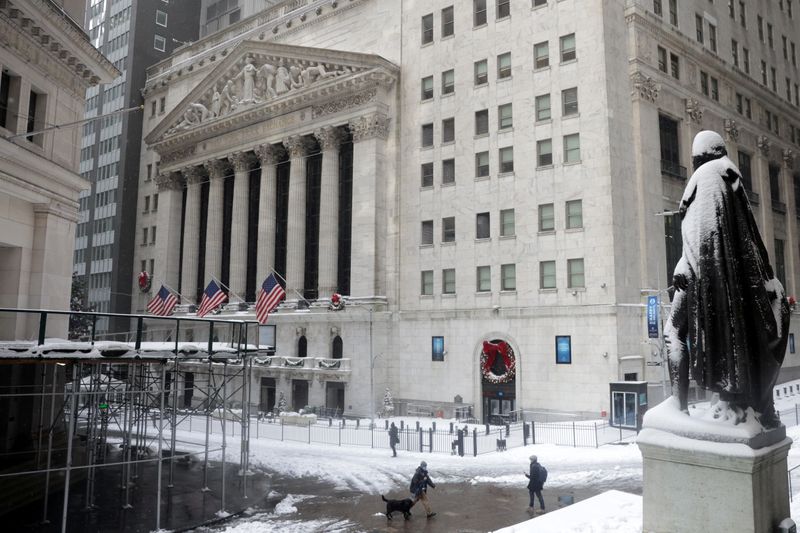By Krystal Hu
(Reuters) - The U.S. Securities and Exchange Commission's approval of capital raisings through direct listings will be seized on by some startups, yet most companies will still opt for initial public offerings (IPOs), capital market insiders say.
The financial regulator greenlighted the New York Stock Exchange's request last week to allow companies to raise money in stock market debuts through direct listings, without using underwriters as is customary with IPOs.
The move was celebrated by Silicon Valley investors, who complain that investment bankers often do a poor job of assessing demand for their IPOs despite charging hefty fees. They point to the offerings this month of home rental firm Airbnb Inc and food delivery app DoorDash Inc, whose shares rallied 92% and 142%, respectively, on their first day of trading and raised concerns that they left money on the table in their IPOs.
Bankers say the pop is caused by the limited number of shares available for trading after an IPO, creating a large gap between the price Wall Street's elite pay to buy into the offering and what stock market investors pay to purchase the shares once they start trading.
Direct listings will not pose such a problem, because stock market investors are allowed to buy shares directly issued by the companies on the first day of trading.
"I'm thrilled to see the SEC taking a progressive approach to the topic. Everybody would like to find more equilibrium between the listing price and the price where it trades, and a bit more fairness around lockups," said Jeff Richards, a partner at GGV Capital.
Still, direct listings present a trade-off that will continue to make IPOs attractive to many companies, capital market experts say. While underwriters give companies certainty of how much they will approximately raise ahead of their IPO, companies that pursue capital raises through direct listings will not know how much they have raised until their shares start trading.
"The SEC move is an added benefit, but I think many companies will still continue to choose an IPO; they will need the underwriters and their introductions to institutional investors," said Anna Pinedo, co-head of law firm Mayer Brown's global capital markets practice.
TWEAKS IN UNDERWRITING
IPOs have been on a tear this year, as companies rode the stock market rally that followed the coronavirus-induced slump. They totaled $220 billion globally, up 25% year-to-date.
Direct listings that do not let companies raise money were already allowed by the SEC, though few companies have opted for them. The most high-profile examples of direct listings this year were those of data analytics company Palantir Technologies and workplace software maker Asana Inc.
One reason many companies may stick with IPOs is that mature private companies tend to generate less buzz among investors than red-hot startups, so their chances of an outsized first-day trading pop are slimmer, capital market experts say.
Companies also like being able to pick their investor base during their underwriting, allocating more shares to long-term investors, such as mutual funds.
"I think the majority of companies will still undergo the traditional IPO process, but with potential innovation in the structure," said Bank of America Corp (NYSE:BAC)'s Neil Kell, chairman of equity capital markets. "The ability of the management team to choose a specific shareholder base at day one is still invaluable."
Recent tweaks to the IPO process deployed by companies such as DoorDash involved using a "hybrid auction" during the underwriting, in which investors are asked to specify exactly how much they are willing to pay for the stakes they seek. Yet this was not enough to eliminate huge first-day trading pops, often fueled by retail investors trading on apps such as Robinhood.
Another tweak involves the ability of insiders to sell stock. While IPOs typically come with lock-ups preventing existing shareholders from cashing out after the initial stock sale, some companies, such as Airbnb, have negotiated exceptions for their employees.
"Largely because of the challenge of the direct listing structure, we are seeing real innovations in IPO practice," said Greg Rodgers, a capital markets partner at law firm Latham & Watkins LLP.
BANKER FEES
A big driver behind the push for direct listings is suspicion among some venture capital investors of investment bankers, whom they view as pushing chummy deals to allocate the most shares in an IPO to their top clients.
While companies that use direct listings do not have to pay underwriting fees, they still have to turn to investment bankers for advice on how much they could be worth and how to market their offerings. Bankers will also advise on capital raisings as the new direct listings are rolled out.
While this fee pool will be smaller than in IPOs, it will also be shared by fewer banks, so any one bank could still be paid handsomely for an offering.
For example, music streaming service Spotify Technology SA, which went public in 2019 through a direct listing, spent $35 million on advisory fees to Goldman Sachs Group Inc (NYSE:GS), Morgan Stanley (NYSE:MS) and Allen & Company.

Goldman Sachs and Morgan Stanley also participated in the IPOs of business software firm Snowflake Inc and Airbnb this year, which paid their underwriters $122 million and $74 million, respectively, but had to share these fees with a much bigger group of banks.